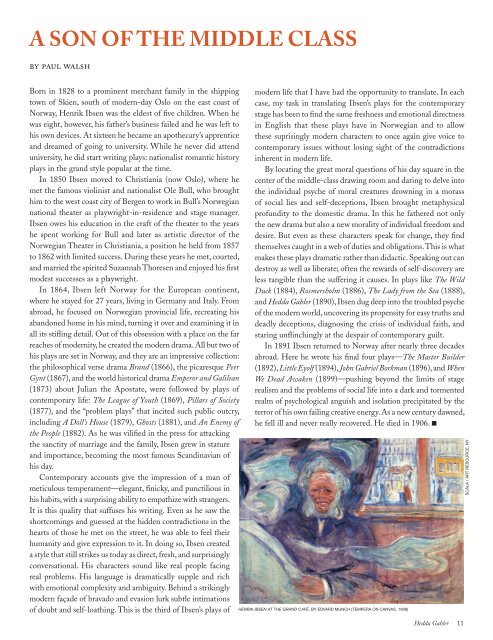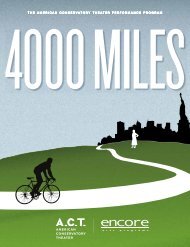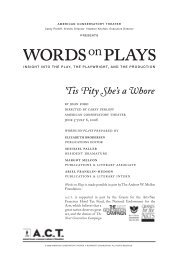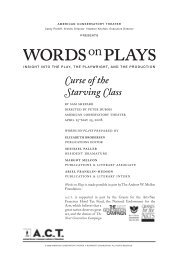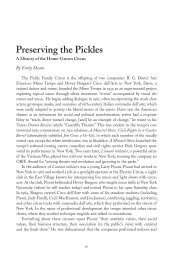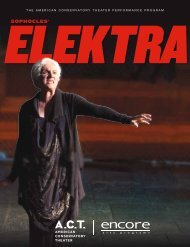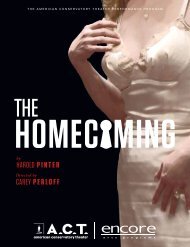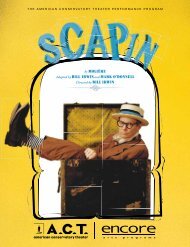Hedda Gabler - American Conservatory Theater
Hedda Gabler - American Conservatory Theater
Hedda Gabler - American Conservatory Theater
You also want an ePaper? Increase the reach of your titles
YUMPU automatically turns print PDFs into web optimized ePapers that Google loves.
A SON OF THE MIDDLE CLASS<br />
by paul walsh<br />
Born in 1828 to a prominent merchant family in the shipping<br />
town of Skien, south of modern-day Oslo on the east coast of<br />
Norway, Henrik Ibsen was the eldest of fi ve children. When he<br />
was eight, however, his father’s business failed and he was left to<br />
his own devices. At sixteen he became an apothecary’s apprentice<br />
and dreamed of going to university. While he never did attend<br />
university, he did start writing plays: nationalist romantic history<br />
plays in the grand style popular at the time.<br />
In 1850 Ibsen moved to Christiania (now Oslo), where he<br />
met the famous violinist and nationalist Ole Bull, who brought<br />
him to the west coast city of Bergen to work in Bull’s Norwegian<br />
national theater as playwright-in-residence and stage manager.<br />
Ibsen owes his education in the craft of the theater to the years<br />
he spent working for Bull and later as artistic director of the<br />
Norwegian <strong>Theater</strong> in Christiania, a position he held from 1857<br />
to 1862 with limited success. During these years he met, courted,<br />
and married the spirited Suzannah Thoresen and enjoyed his fi rst<br />
modest successes as a playwright.<br />
In 1864, Ibsen left Norway for the European continent,<br />
where he stayed for 27 years, living in Germany and Italy. From<br />
abroad, he focused on Norwegian provincial life, recreating his<br />
abandoned home in his mind, turning it over and examining it in<br />
all its stifl ing detail. Out of this obsession with a place on the far<br />
reaches of modernity, he created the modern drama. All but two of<br />
his plays are set in Norway, and they are an impressive collection:<br />
the philosophical verse drama Brand (1866), the picaresque Peer<br />
Gynt (1867), and the world historical drama Emperor and Galilean<br />
(1873) about Julian the Apostate, were followed by plays of<br />
contemporary life: The League of Youth (1869), Pillars of Society<br />
(1877), and the “problem plays” that incited such public outcry,<br />
including A Doll’s House (1879), Ghosts (1881), and An Enemy of<br />
the People (1882). As he was vilifi ed in the press for attacking<br />
the sanctity of marriage and the family, Ibsen grew in stature<br />
and importance, becoming the most famous Scandinavian of<br />
his day.<br />
Contemporary accounts give the impression of a man of<br />
meticulous temperament—elegant, fi nicky, and punctilious in<br />
his habits, with a surprising ability to empathize with strangers.<br />
It is this quality that suffuses his writing. Even as he saw the<br />
shortcomings and guessed at the hidden contradictions in the<br />
hearts of those he met on the street, he was able to feel their<br />
humanity and give expression to it. In doing so, Ibsen created<br />
a style that still strikes us today as direct, fresh, and surprisingly<br />
conversational. His characters sound like real people facing<br />
real problems. His language is dramatically supple and rich<br />
with emotional complexity and ambiguity. Behind a strikingly<br />
modern façade of bravado and evasion lurk subtle intimations<br />
of doubt and self-loathing. This is the third of Ibsen’s plays of<br />
modern life that I have had the opportunity to translate. In each<br />
case, my task in translating Ibsen’s plays for the contemporary<br />
stage has been to fi nd the same freshness and emotional directness<br />
in English that these plays have in Norwegian and to allow<br />
these suprisingly modern characters to once again give voice to<br />
contemporary issues without losing sight of the contradictions<br />
inherent in modern life.<br />
By locating the great moral questions of his day square in the<br />
center of the middle-class drawing room and daring to delve into<br />
the individual psyche of moral creatures drowning in a morass<br />
of social lies and self-deceptions, Ibsen brought metaphysical<br />
profundity to the domestic drama. In this he fathered not only<br />
the new drama but also a new morality of individual freedom and<br />
desire. But even as these characters speak for change, they fi nd<br />
themselves caught in a web of duties and obligations. This is what<br />
makes these plays dramatic rather than didactic. Speaking out can<br />
destroy as well as liberate; often the rewards of self-discovery are<br />
less tangible than the suffering it causes. In plays like The Wild<br />
Duck (1884), Rosmersholm (1886), The Lady from the Sea (1888),<br />
and <strong>Hedda</strong> <strong>Gabler</strong> (1890), Ibsen dug deep into the troubled psyche<br />
of the modern world, uncovering its propensity for easy truths and<br />
deadly deceptions, diagnosing the crisis of individual faith, and<br />
staring unfl inchingly at the despair of contemporary guilt.<br />
In 1891 Ibsen returned to Norway after nearly three decades<br />
abroad. Here he wrote his fi nal four plays—The Master Builder<br />
(1892), Little Eyolf (1894), John Gabriel Borkman (1896), and When<br />
We Dead Awaken (1899)—pushing beyond the limits of stage<br />
realism and the problems of social life into a dark and tormented<br />
realm of psychological anguish and isolation precipitated by the<br />
terror of his own failing creative energy. As a new century dawned,<br />
he fell ill and never really recovered. He died in 1906. ■<br />
HENRIK IBSEN AT THE GRAND CAFÉ, BY EDVARD MUNCH (TEMPERA ON CANVAS, 1908)<br />
<strong>Hedda</strong> <strong>Gabler</strong> 11<br />
SCALA / ART RESOURCE, NY


